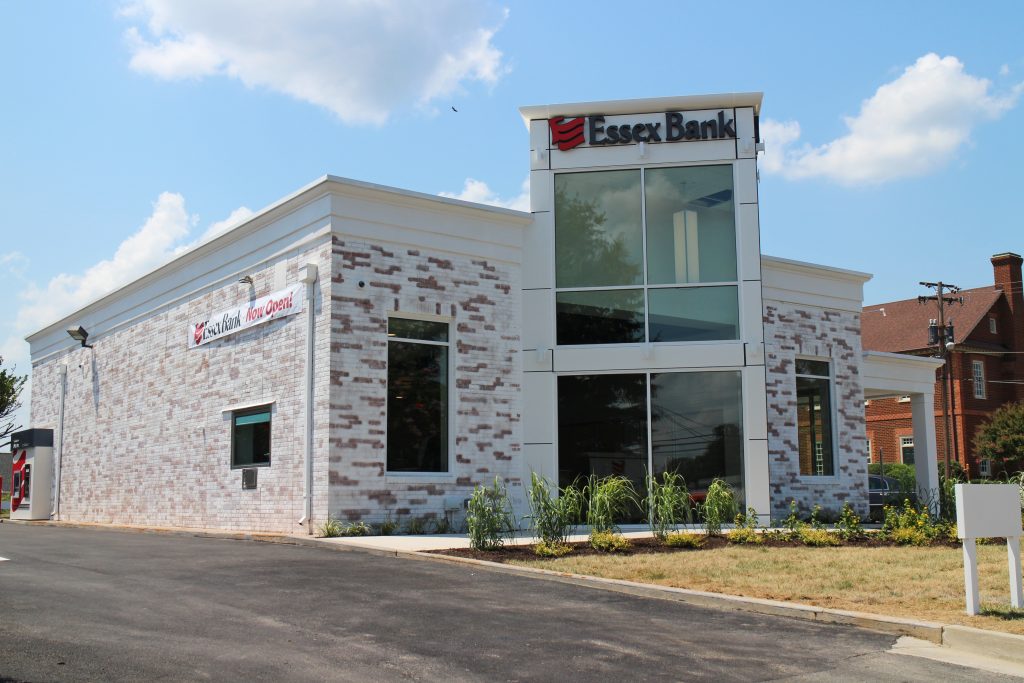A local bank has worked an early exit out of a pact that dates back to its purchase of a failed bank during the recession.
Essex Bank last week struck a deal for an early termination of its shared-loss agreement with the FDIC related to a portfolio of loans it acquired from the former Suburban Federal Savings Bank, a $368 million Crofton, Maryland-based institution that was shut down by the banking regulator in early 2009.
Essex, which at the time was known as Bank of Essex and was headquartered in Tappahannock, assumed $348 million of Suburban Federal’s assets at a substantial discount.
Shared-loss agreements, which are a common practice when banks take over a failed peer, calls for the FDIC to cover 80 percent of the future losses on loans taken on by the healthier bank.
This one was to run for losses incurred through January 2019.
Rex Smith, CEO of Essex Bank and its Community Bankers Trust parent company, said the move to exit the agreement early was made because many of the Suburban Federal loans are not the same risk they once were deemed to be.
“The loans we had purchased were performing better than what we had anticipated,” Smith said. “A lot of them are performing nicely.”
As part of the early termination deal, the FDIC agreed to pay Essex $3.1 million, which accounts for the bank’s share of estimated loan losses remaining in the pool. The bank will take a one-time charge of approximately $8 million during the third quarter, resulting from the write-off of what’s known as an indemnification asset, which is an accounting of money that was expected to be reimbursed over time for potential losses on the FDIC-covered loans.
“It’s a complicated accounting treatment,” Smith said.
Smith said the bank will make that $8 million up in about two years based on the money the company saves by eliminating the future amortization expense of the indemnification asset, which costs the bank about $1.2 million a quarter.
It also eliminates the administrative costs of quarterly certifications that had to be made for the shared-loss pool to the FDIC, as well as the costs of running regular models that estimated the potential losses on the loans in question.
Essex purchased two failed banks during the recession. One was Suburban and the other was The Community Bank in Loganville, Georgia, in late 2008. That deal did not involve the purchase of a loan portfolio and therefore did not involve a shared-loss agreement.
The loans from Suburban were in two pools, Smith said, single-family real estate and non-single-family real estate.
The shared-loss on the non-single-family pool expired in March 2014, and the early termination means the bank will now be on its own for the rest of the single-family loans should any become problematic.
Smith said it was a move worth making.
“When we bought those back in 2009, the real estate world was not a pretty place,” he said. “The world is obviously a lot different place now.”
Essex is a $1.1 billion bank headquartered at Deep Run III in Henrico County. It has 22 branches, 15 of which are in Virginia and seven of which are in Maryland. Several of those in Maryland were taken over in the Suburban Federal deal.
Its parent company reported net income for the second quarter of $1.69 million, up from $1.53 million in the same period last year. It has turned a profit of $3 million through the first half of the year, down slightly from the first half of 2014.
Its total loans are $743 million, $59 million of which were covered under the shared-loss agreement, according to its financials as of June 30.
A local bank has worked an early exit out of a pact that dates back to its purchase of a failed bank during the recession.
Essex Bank last week struck a deal for an early termination of its shared-loss agreement with the FDIC related to a portfolio of loans it acquired from the former Suburban Federal Savings Bank, a $368 million Crofton, Maryland-based institution that was shut down by the banking regulator in early 2009.
Essex, which at the time was known as Bank of Essex and was headquartered in Tappahannock, assumed $348 million of Suburban Federal’s assets at a substantial discount.
Shared-loss agreements, which are a common practice when banks take over a failed peer, calls for the FDIC to cover 80 percent of the future losses on loans taken on by the healthier bank.
This one was to run for losses incurred through January 2019.
Rex Smith, CEO of Essex Bank and its Community Bankers Trust parent company, said the move to exit the agreement early was made because many of the Suburban Federal loans are not the same risk they once were deemed to be.
“The loans we had purchased were performing better than what we had anticipated,” Smith said. “A lot of them are performing nicely.”
As part of the early termination deal, the FDIC agreed to pay Essex $3.1 million, which accounts for the bank’s share of estimated loan losses remaining in the pool. The bank will take a one-time charge of approximately $8 million during the third quarter, resulting from the write-off of what’s known as an indemnification asset, which is an accounting of money that was expected to be reimbursed over time for potential losses on the FDIC-covered loans.
“It’s a complicated accounting treatment,” Smith said.
Smith said the bank will make that $8 million up in about two years based on the money the company saves by eliminating the future amortization expense of the indemnification asset, which costs the bank about $1.2 million a quarter.
It also eliminates the administrative costs of quarterly certifications that had to be made for the shared-loss pool to the FDIC, as well as the costs of running regular models that estimated the potential losses on the loans in question.
Essex purchased two failed banks during the recession. One was Suburban and the other was The Community Bank in Loganville, Georgia, in late 2008. That deal did not involve the purchase of a loan portfolio and therefore did not involve a shared-loss agreement.
The loans from Suburban were in two pools, Smith said, single-family real estate and non-single-family real estate.
The shared-loss on the non-single-family pool expired in March 2014, and the early termination means the bank will now be on its own for the rest of the single-family loans should any become problematic.
Smith said it was a move worth making.
“When we bought those back in 2009, the real estate world was not a pretty place,” he said. “The world is obviously a lot different place now.”
Essex is a $1.1 billion bank headquartered at Deep Run III in Henrico County. It has 22 branches, 15 of which are in Virginia and seven of which are in Maryland. Several of those in Maryland were taken over in the Suburban Federal deal.
Its parent company reported net income for the second quarter of $1.69 million, up from $1.53 million in the same period last year. It has turned a profit of $3 million through the first half of the year, down slightly from the first half of 2014.
Its total loans are $743 million, $59 million of which were covered under the shared-loss agreement, according to its financials as of June 30.

